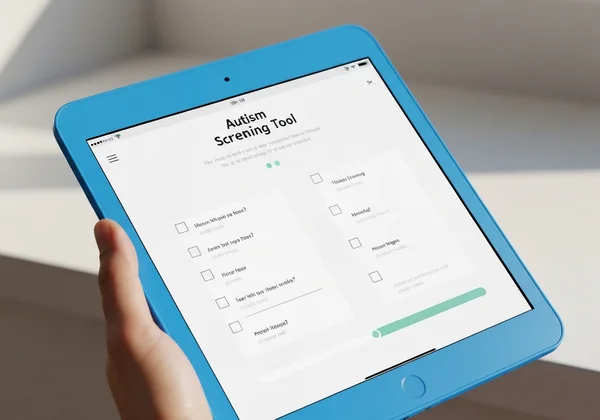The Ultimate Autism Spectrum Test & Diagnosis Guide
November 11, 2025 | By Leo Whitaker
Are you wondering if you or a loved one might be on the autism spectrum? Navigating the world of autism spectrum disorder (ASD) can feel overwhelming, from initial curiosity to understanding diagnosis and finding support. How do I know if I am autistic? This question is a common starting point for a journey of self-discovery. This comprehensive guide will walk you through everything you need to know about the autism spectrum test, from understanding the signs to finding reliable screening tools and professional support. Discover how the resources at Autism Spectrum Test can be your first step toward clarity and understanding.
Understanding Autism Spectrum Disorder (ASD)
Before diving into tests and diagnoses, it's essential to build a foundational knowledge of what autism is. Understanding the core aspects of ASD helps frame the journey with empathy and accuracy, moving beyond stereotypes to see the individual. This knowledge empowers you to ask the right questions and seek the most appropriate support.
What Exactly Is Autism Spectrum Disorder?
Autism Spectrum Disorder (ASD) is a neurodevelopmental difference that affects how a person communicates, interacts with others, and experiences the world. The term "spectrum" is crucial because it highlights the vast diversity within the autistic community. There is no single "look" or experience of autism; it encompasses a wide range of strengths, challenges, and support needs. Rather than a disease to be cured, autism is an integral part of a person's identity.
Common Signs of Autism in Different Age Groups
Autism traits can manifest differently throughout a person's life. While every individual is unique, there are common patterns that parents, educators, or individuals themselves might notice.
-
In Children: Early signs can include delayed speech development, difficulty with eye contact, repetitive behaviors like hand-flapping (stimming), intense interests in specific topics, and challenges with social back-and-forth play. They may also have strong reactions to sensory input like sounds or textures.
-
In Teens: Social challenges may become more apparent as social rules become more complex. A teen on the spectrum might find it hard to navigate friendships, understand sarcasm, or prefer solitary activities. They may also experience significant anxiety related to school and social expectations.
-
In Adults: Many adults seek an assessment after recognizing traits in themselves that they've struggled with for years. This can include persistent difficulties in maintaining relationships, workplace challenges, sensory overload in busy environments, and a feeling of being "different" or having to "mask" their true self to fit in. An autism test for adults can provide valuable insights.

Debunking Common Autism Myths and Misconceptions
Misinformation about autism can create harmful stereotypes. It's vital to separate fact from fiction. For instance, the idea that autistic people lack empathy is a pervasive myth; they often feel empathy deeply but may express it differently. Similarly, not every autistic person is a "savant" with extraordinary abilities in one area. Recognizing and challenging these myths is a key part of fostering an inclusive and understanding society.
Online Autism Screening: Your First Step to Insight
For many, the journey begins with an online search. An online autism screening is a private, accessible, and low-pressure way to explore potential autistic traits. It serves as a preliminary tool to gather information and decide on the next steps, helping you organize your thoughts and observations before seeking professional advice.
How Accurate Are Online Autism Tests?
This is a critical question. It is essential to understand that online tests are screening tools, not diagnostic instruments. They cannot provide a formal medical diagnosis. However, a high-quality, scientifically-based screener can be quite accurate in identifying traits that warrant further investigation by a professional. These tests work by comparing your responses to patterns commonly seen in autistic individuals. Think of it as a well-informed first opinion that can guide your decision to seek a formal assessment.
The Role of Free Autism Tests in Early Identification
The availability of a free autism test removes financial barriers and provides immediate access to information. For parents observing developmental differences in their child, or adults reflecting on a lifetime of unique experiences, a confidential online tool is an invaluable starting point. It allows for private exploration and can provide the confidence needed to take the next step. Our platform offers a reliable autism spectrum test designed for different age groups, providing instant insights to help you move forward.

Exploring Different Online Autism Screeners (AQ, RAADS-R)
Many online tests are based on established clinical screening questionnaires. Tools like the Autism-Spectrum Quotient (AQ) test and the Ritvo Autism Asperger Diagnostic Scale-Revised (RAADS-R) are respected instruments used in research and clinical settings. Our platform utilizes questions based on such established research to provide a reliable initial screening. Understanding that these tools have a scientific basis helps build trust in the process and the results you receive.
Navigating the Formal Autism Diagnosis Process
After an online screening suggests you or a loved one may be on the spectrum, the next phase is pursuing a formal autism diagnosis. This process is the only way to get a definitive answer and unlock access to specialized support, therapies, and accommodations. While it can seem daunting, knowing what to expect can make the journey smoother.
Who Can Provide a Formal Autism Diagnosis?
A formal diagnosis must be made by a qualified healthcare professional with expertise in neurodevelopmental conditions. This typically includes clinical psychologists, neuropsychologists, developmental pediatricians, or psychiatrists. It's important to find a provider who has experience working with your specific age group (child, teen, or adult) to ensure the assessment is thorough and relevant.
What to Expect During a Professional Autism Assessment
A professional assessment is comprehensive and multi-faceted. It's much more than a simple checklist. The process often involves detailed interviews about developmental history, social and communication skills, and daily life challenges. It may also include direct observation, especially for children, and standardized tests that assess cognitive and behavioral patterns. The goal is to build a complete picture of an individual's strengths and challenges.

Understanding Your Autism Diagnosis Report
If a diagnosis is confirmed, you will receive a detailed written report. This document will explain the findings, confirm the diagnosis, and often provide personalized recommendations. These recommendations might include suggestions for therapies (like speech or occupational therapy), educational accommodations, workplace support strategies, and resources for connecting with the autistic community.
Life After an Autism Diagnosis: Support and Empowerment
Receiving an autism diagnosis is not an end point; it's the beginning of a new chapter of understanding and self-acceptance. It can provide a framework for understanding past experiences and a roadmap for navigating the future with greater confidence and support.
Practical Strategies for Daily Living with Autism
An autism diagnosis can unlock a new understanding of personal needs. For many, this leads to developing practical strategies to thrive. This could mean using noise-canceling headphones to manage sensory sensitivities, creating structured routines to reduce anxiety, or learning to set boundaries to avoid social burnout. It's about tailoring your environment and habits to work with your brain, not against it.
Building a Strong Support System for Autistic Individuals
No one has to navigate this journey alone. A strong support system is crucial. This network can include understanding family members, supportive friends, therapists, and peers from the autistic community. Connecting with other autistic people can be particularly validating, offering a sense of belonging and shared experience that is incredibly powerful.
Embracing Neurodiversity and Self-Advocacy
The concept of neurodiversity reframes autism and other neurological differences as natural variations in the human brain. Embracing this perspective fosters self-acceptance and empowerment. Learning to advocate for your needs—whether at school, work, or in personal relationships—is a key skill that allows autistic individuals to live authentically and achieve their full potential.

Your Journey to Understanding and Support Starts Here
Whether you're a concerned parent, a teen trying to understand yourself, or an adult reflecting on your life's journey, seeking clarity is a courageous and important step. From understanding the initial signs to navigating a formal diagnosis and building a supportive life, the path to understanding autism is one of discovery.
The first step doesn't have to be the hardest. A confidential and reliable online screening can provide the initial insights you need to move forward with confidence. Take our free test today to begin your journey toward clarity, empowerment, and support.
Frequently Asked Questions
What is the most accurate autism test?
The most accurate autism test is a formal diagnostic assessment conducted by a qualified professional, like a clinical psychologist. Online screening tests, while not diagnostic, are valuable for initial self-assessment. A high-quality online tool based on scientific research can accurately indicate if a formal evaluation is a good next step.
How do I know if I am autistic?
Recognizing if you are autistic often starts with self-reflection. You might notice long-standing patterns in social interactions, communication style, intense interests, or sensory sensitivities. Taking a confidential online autism screening can help you organize these observations and see if they align with common autistic traits, providing a clearer direction for your journey.
What to do after a positive autism screening test?
A positive result on a screening test is an indication that you should consider seeking a formal diagnosis from a qualified healthcare provider. Use your screening results as a starting point to discuss your experiences with a doctor or psychologist. It is a tool for insight, not a final answer.
Can you be mildly autistic?
The term "mildly autistic" is often used, but the autism spectrum is more complex than a simple linear scale. Autism is now often understood in terms of support needs (e.g., low support needs vs. high support needs). Someone with lower support needs may not require as many accommodations, but they are still fully autistic.
Am I autistic or just socially awkward?
While there can be an overlap, the key difference often lies in the underlying reasons and pervasiveness of the experience. Social awkwardness may be situational, whereas the social challenges associated with autism stem from fundamental differences in processing social information. An am I autistic test can help you explore these nuances further.